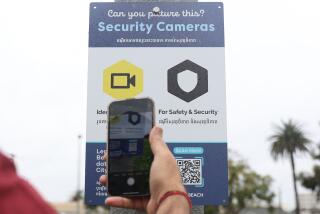Police Must Curb Access to Computers : Agencies Should Ensure That Confidential Data Is Limited to Those Who Need It
The Anaheim Police Department is wisely looking at restrictions on use of its computers by its own employees after determining that confidential information was twice obtained improperly, and perhaps illegally.
Last November, someone--it is not yet clear who--used the computer to search for the home addresses of four abortion rights activists. Weeks later, abortion opponents protested at the homes of two of the activists. In the second incident, a department employee used the computer to get information on a car driven by a relative. That worker has now been disciplined, although police won’t specify how. The department has also asked the district attorney’s office to investigate whether any crime occurred.
Police databanks bulge with information about individuals, ranging from names and addresses to criminal records and outstanding warrants. The potential for abuse is clear, and police must ensure that access to data is limited to those on the force who need it.
The first step taken in Anaheim was basic: telling people who walk away from the computer to turn it off. That will stop a co-worker from slipping into a temporarily vacated seat, punching a few buttons and obtaining information normally outside the interloper’s reach. The department may limit further the number of people who have access to information, much as the military’s practice of sharing data on a “need-to-know” basis. That’s a good idea.
Anaheim police say they have not determined if the information on the abortion rights activists’ addresses was passed on, or if the activists’ opponents obtained it elsewhere. But the breach was sufficiently disturbing that Police Chief Joseph T. Molloy apologized, which was appropriate.
The Anaheim incidents are less serious than two recent cases elsewhere in the state. In Los Angeles, a former detective was charged last month with selling confidential information illegally obtained from a Police Department computer to a private investigator. In San Francisco, officials are investigating a former police officer who allegedly provided an investigator for the Anti-Defamation League with restricted police information such as home addresses, vehicle listings and criminal histories.
All these reports offer a cautionary tale for police departments throughout Orange County. An Anaheim police lieutenant said the incidents in his department were not a trend. But it is a crime to use a police computer for illegal purposes, and the district attorney’s investigation is warranted.
More to Read
Sign up for Essential California
The most important California stories and recommendations in your inbox every morning.
You may occasionally receive promotional content from the Los Angeles Times.









